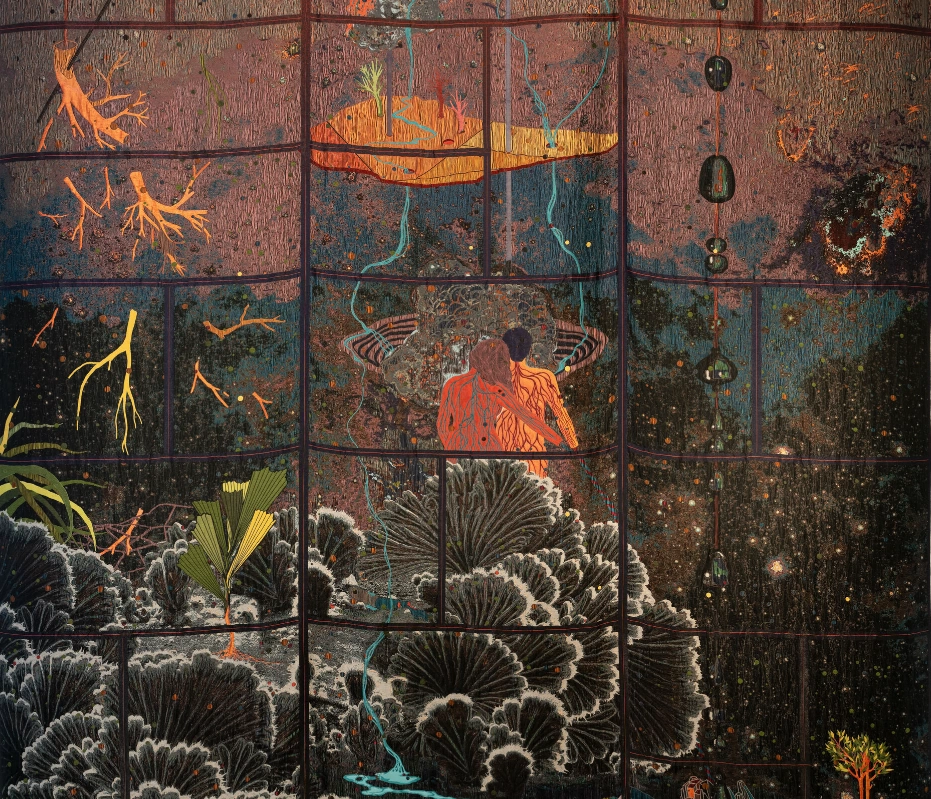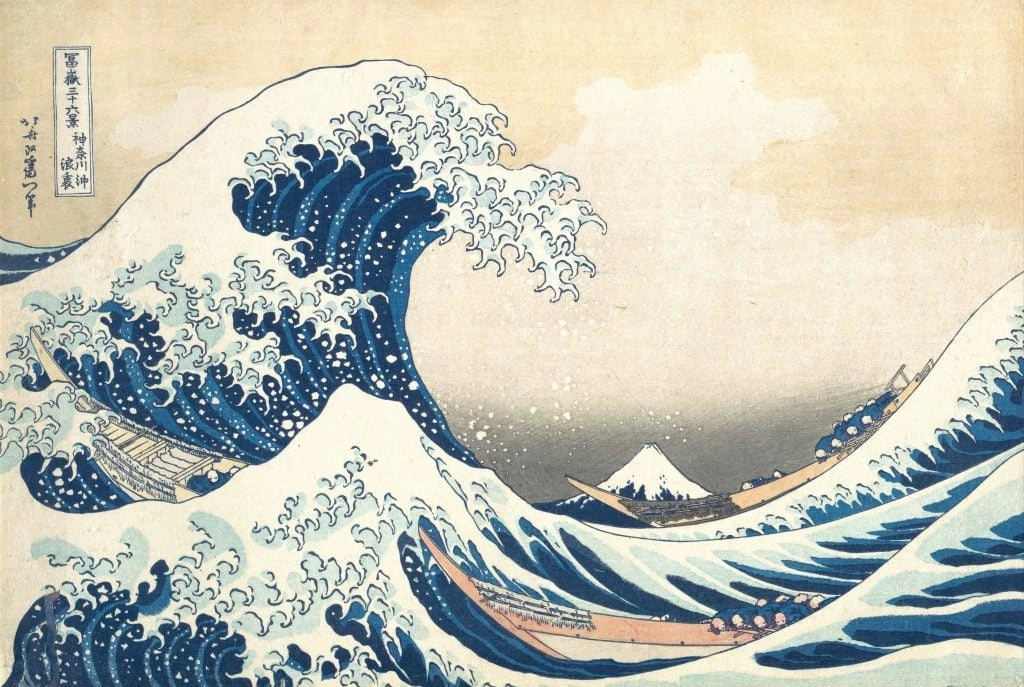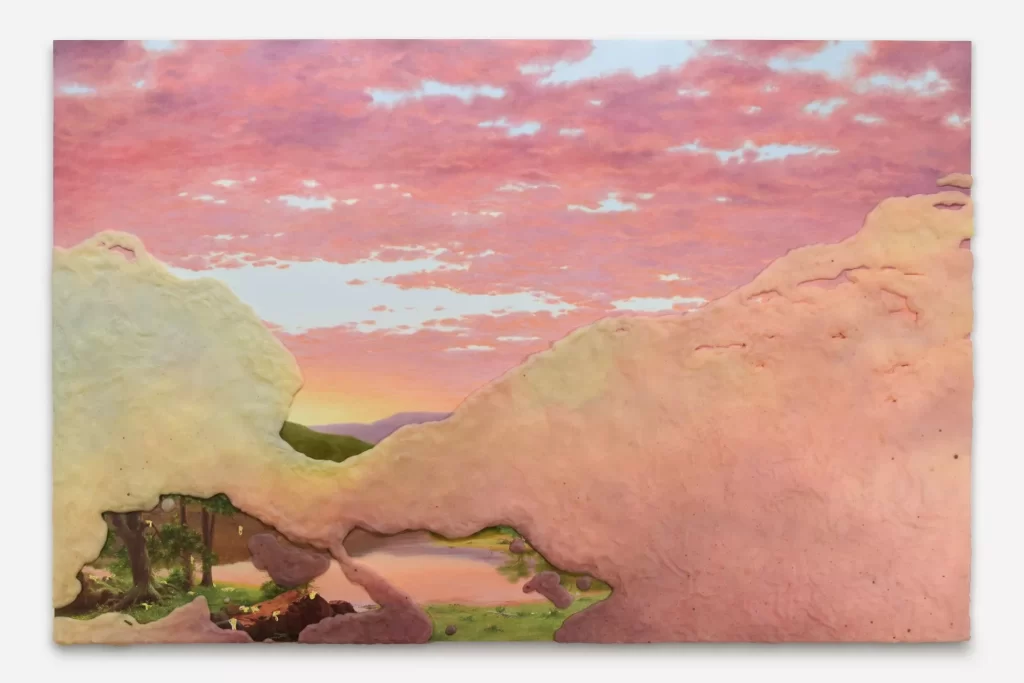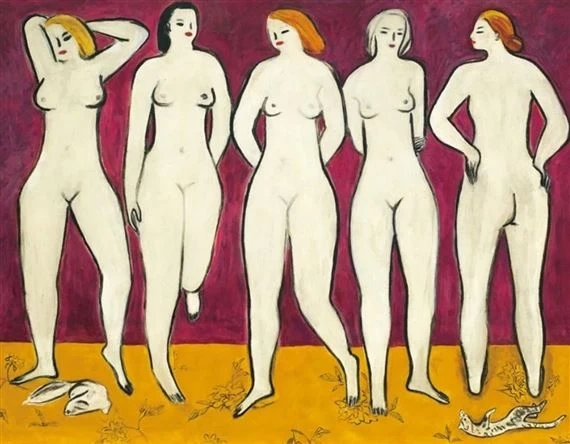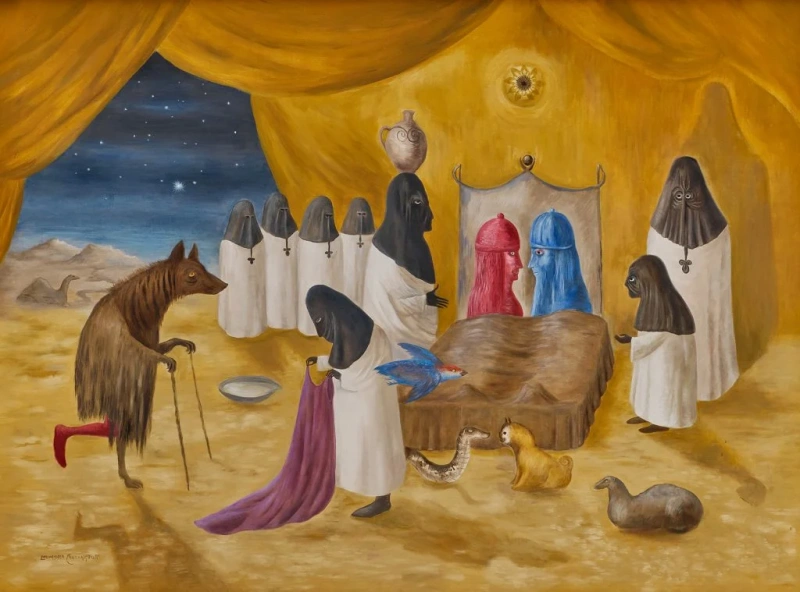Here’s a round-up of what you can look forward to in 2024, from the Met’s buzzy Harlem Renaissance survey to Firelei Báez’s ICA Boston debut.
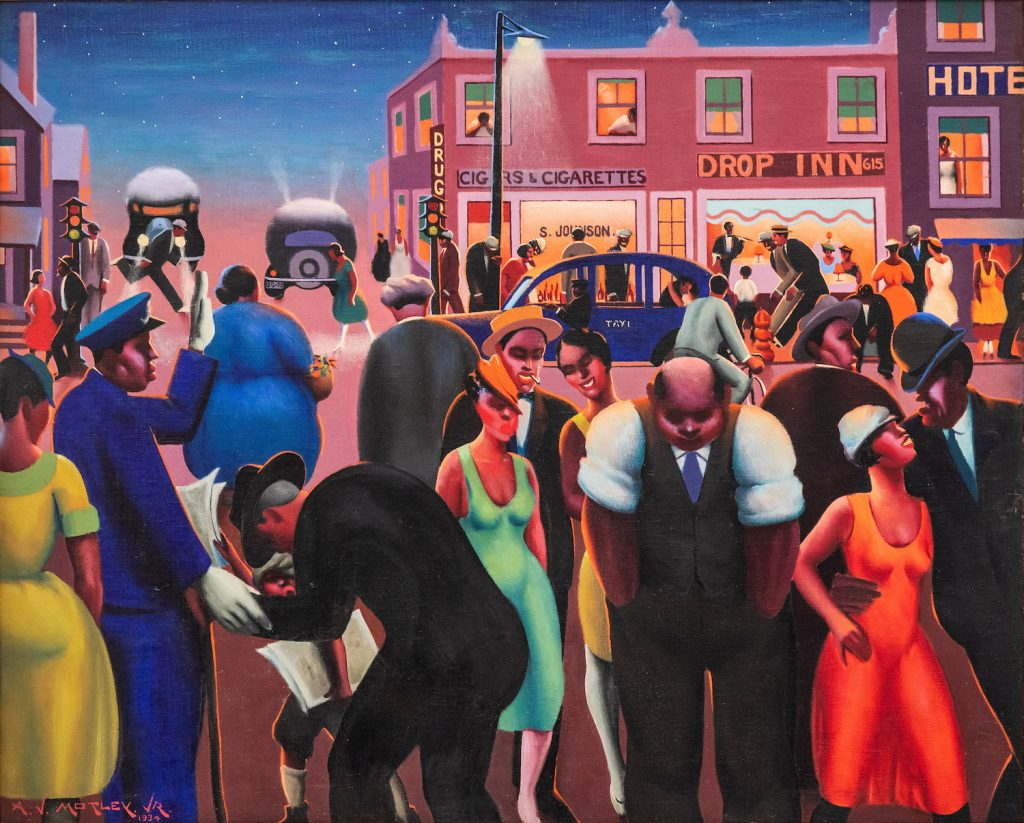
Archibald J. Motley, Jr., ‘Black Belt’ (1934)
Collection of the Hampton University Museum, Hampton, Virginia © Estate of Archibald John Motley Jr. All reserved rights 2023 / Bridgeman Images
Image courtesy Hampton University
With 2024 just on the horizon, we here at Artnet News have already started planning our visits to the most important, must-see museum exhibitions opening in 2024. If you’re looking for a go-to list of stellar exhibitions opening across the U.S. in the next few months, you’ve come to the right place. Below, find twelve upcoming exhibitions opening through May.
“Zanele Muholi: Eye Me”
San Francisco Museum of Modern Art
January 18–August 11, 2024
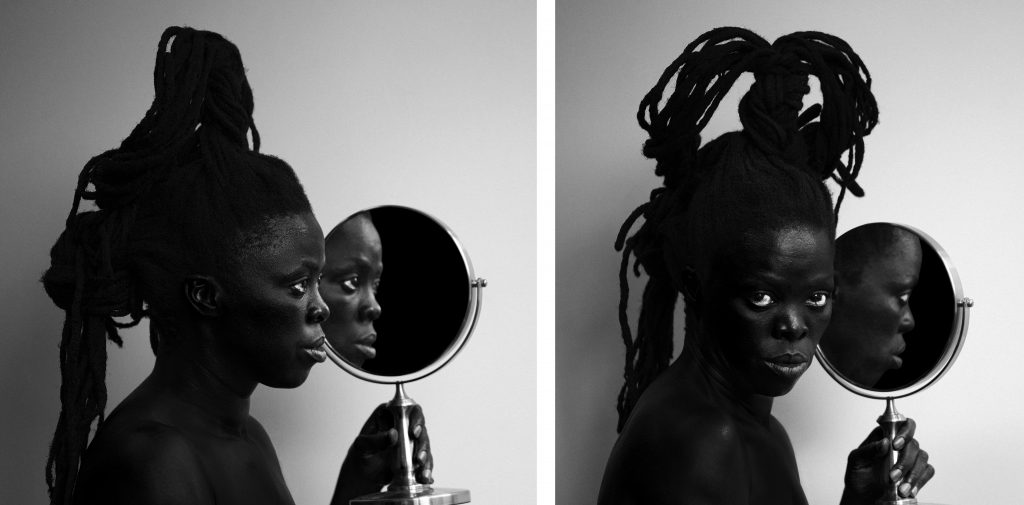
Zanele Muholi, Zazi I & II, Boston (2019). Bader and Simon Collection. © Zanele Muholi.
Courtesy of the artist and San Francisco Museum of Modern Art.
“Eye Me” is the first major museum solo exhibition of South African artist Zanele Muholi on the West Coast. Featuring more than 100 photographs by the artist dated from between 2002 through today, alongside a selection of paintings, sculptures, and video works, the show offers a comprehensive look into the artist’s practice—for both those new to her work and longtime followers. Recognized for her ongoing engagement with the Black queer community of post-Apartheid South Africa, Muholi’s work is frequently situated at the intersection of art and activism. Regardless of a specific subject, Muholi’s work emphasizes the power and beauty, as well as the complex history, of LGBTQ+ communities.
“Giants”
Brooklyn Museum of Art
February 10–July 7, 2024
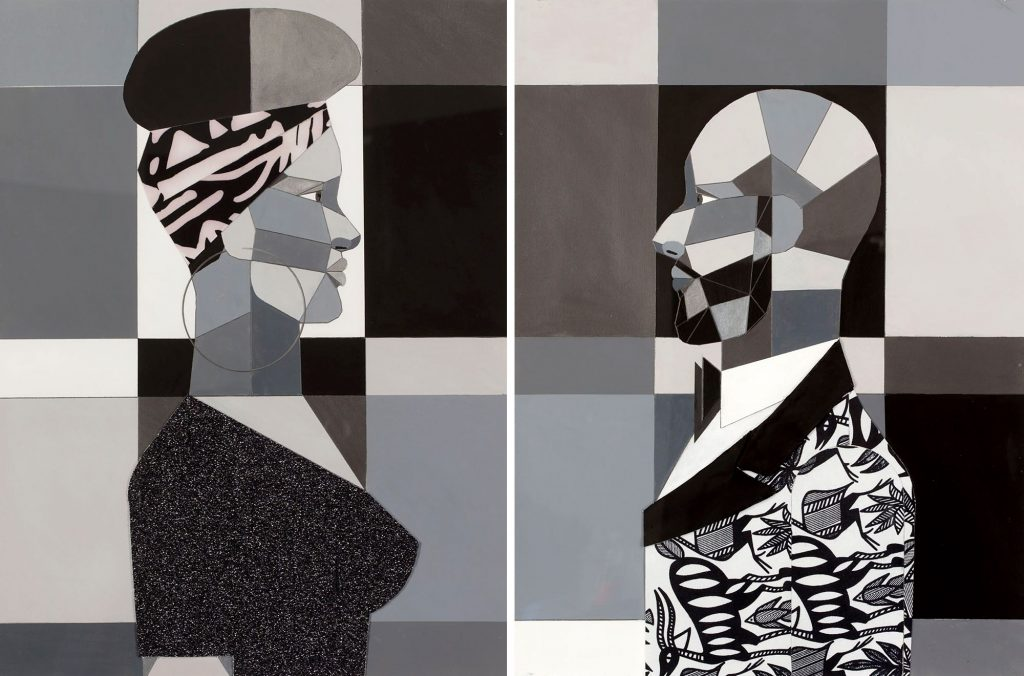
Derrick Adams, ‘Woman in Grayscale (Alicia)’ and ‘Man in Grayscale (Swizz)’ (2017).
©2023 Derrick Adams Studio/Photo: Glenn Steigelman/Courtesy Swizz Beatz and Alicia Keys
“Giants” is the first major exhibition to go on view from the prized art collection of musical icons Swizz Beatz (Kasseem Dean) and Alicia Keys. The Deans, who’ve long advocated for Black creatives to support Black artists, have put their money where their mouth is and, over the last 20 years, have amassed one of the most vital collections of artists of color in the world—both representing and celebrating diasporic Blackness. In “Giants,” the museum’s curator Kimberli Gant brings together over 100 of these works by the likes of Lorna Simpson, Kehinde Wiley, Henry Taylor, Amy Sherald, Barkley L. Hendricks, Ernie Barnes, Derrick Adams, and Jean-Michel Basquiat, as well as photographers Gordon Parks, Kwame Brathwaite, and Malick Sidibé. The title refers not only to standing on the shoulders of giants, but in some cases to the monumentality of the works themselves, as in the show’s finale in the Great Hall atrium, where Nina Chanel Abney’s towering Catfish (2017) painting, all eight by 18 feet, and Arthur Jafa’s Big Wheel I (2018) loom large. Following the exhibition, a promised gift from the collection will be donated to the museum, where Swizz Beatz is no stranger, having recently served on the board of directors.
The Harlem Renaissance and Transatlantic Modernism
The Metropolitan Museum of Art
February 25—July 28, 2024
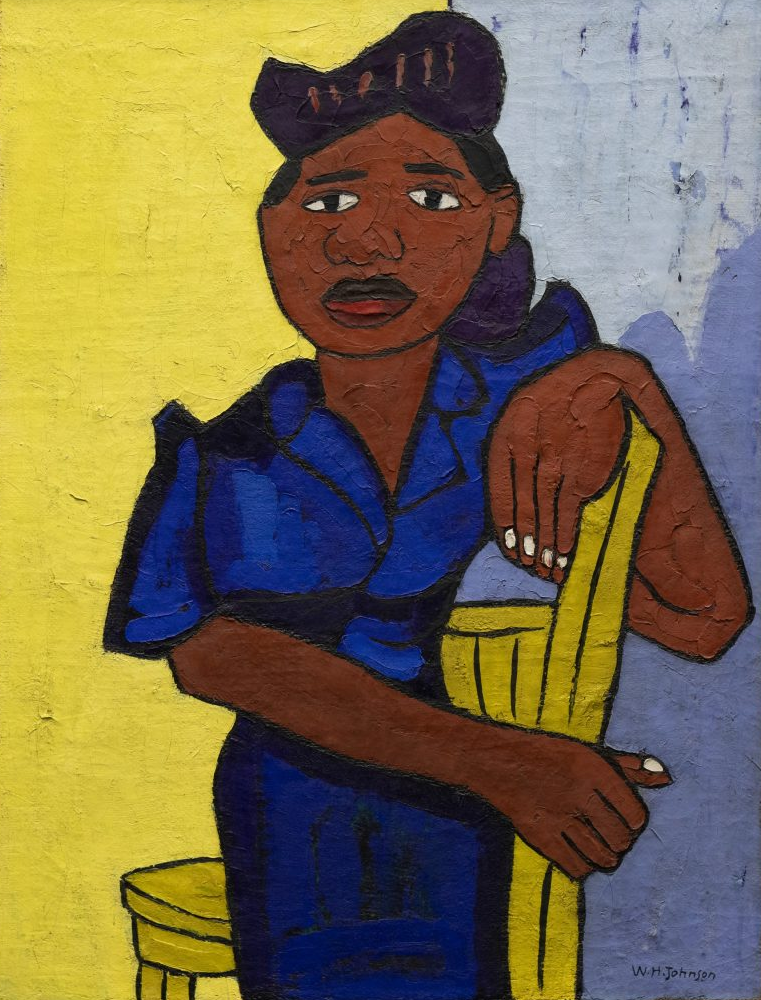
William Henry Johnson, ‘Woman in Blue’ (ca. 1943)
Courtesy Clark Atlanta University Art Museum.
Undoubtedly one of the most buzzed-about shows for the year ahead is the Metropolitan Museum of Art’s February opening of “The Harlem Renaissance and Transatlantic Modernism,” which will feature over 150 artworks including paintings, sculpture, photography, film, and other ephemera.
The show delves into the far-reaching impact of Black artists portraying everyday life in the new Black cities that sprang up in the decades between the 1920s and 40s, particularly in Harlem but also nationwide. The show explores the early years of the Great Migration when African Americans began leaving the segregated South in drove. It’s the first major survey of the subject in New York City since 1987. Featured artists include Charles Alston, Aaron Douglas, Meta Warrick Fuller, William H. Johnson, Archibald Motley, Winold Reiss, Augusta Savage, James Van Der Zee, and Laura Wheeler Waring.
“Blood: Medieval/Modern”
J. Paul Getty Museum, Los Angeles
February 27–May 19, 2024

‘Ecce Homo’ (about 1500) from ‘Poncher Hours’.
Collection of the J. Paul Getty Museum, Los Angeles.
Whether fascinating or taboo, blood has been a perennial source of inspiration for artists over the centuries. Tapping the museum’s premier collection of medieval illuminated manuscripts, this show explores the multifaceted early visual culture surrounding blood, ranging from literal and medical to symbolic and devotional. Through examinations of medieval representations of blood, the show’s line of inquiry intersects with decidedly modern conversations, such as around feminism, HIV/AIDs, DNA genealogy, and more. Tracing connections and ruptures, the representation of blood in art becomes a through line across Western art history.
“Janet Sobel: All-Over”
February 23–August 11, 2024
The Menil Collection
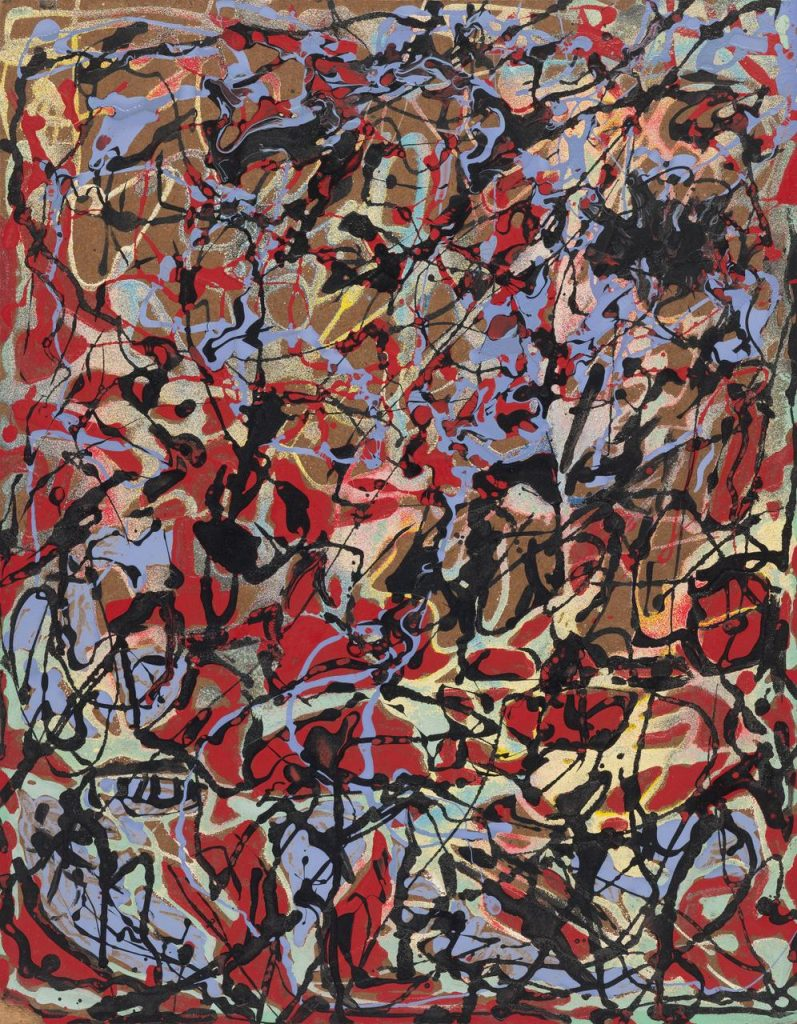
Janet Sobel, ‘Untitled’ (ca. 1946–48).
The Menil Collection, Houston, Gift of Leonard Sobel and Family.
© Janet Sobel. Photo: James Craven
Did Ukrainian-born, Brooklyn artist Janet Sobel invent drip painting well before Jackson Pollock? This exhibition at the Menil Collection in Houston offers new insights into this long-overlooked artist’s brief but pivotal involvement in the mid-century Abstract Expressionist scene. The artist, a Jewish mother of five, was known for laying her canvases flat on her Brighton Beach apartment floor and dripping paint in evocative gestures that teacher her compositions’ edges. Esteemed critic Clement Greenberg remarked that Sobel’s paintings had “the first really all-over effect that I had seen.” This exhibition, organized with the artist’s family, marks the first time Sobel’s paintings, along with a number of works on paper, have been united in over 60 years.
“Joyce J. Scott: Walk a Mile in My Dreams”
The Baltimore Museum of Art
March 24—July 14, 2024
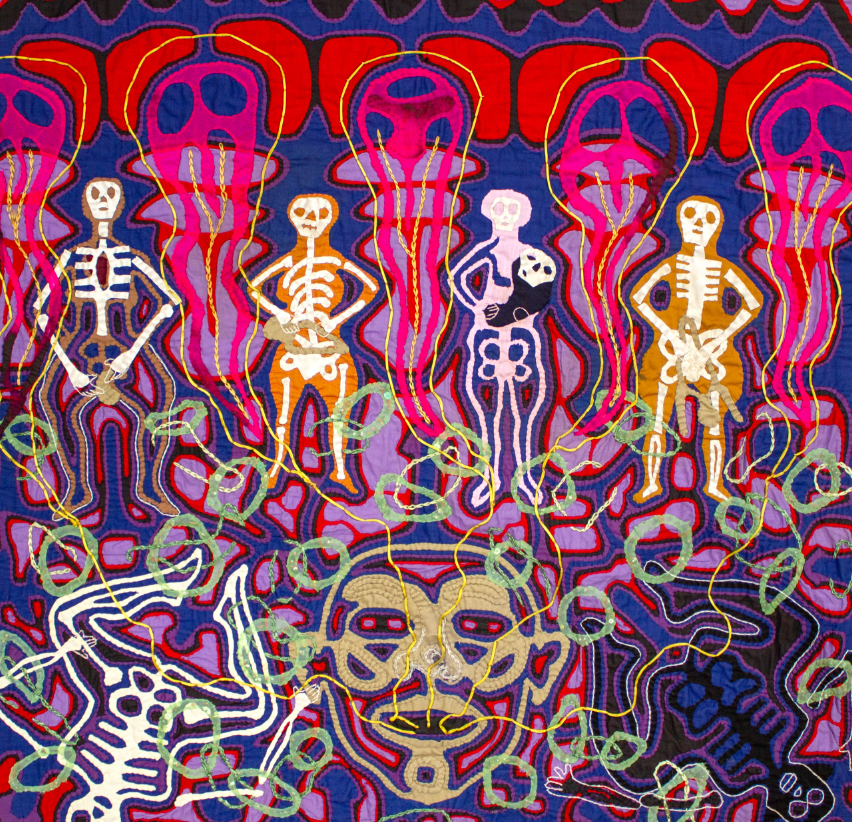
Joyce J. Scott (American, born 1948)
Title: Motherhood 3000, 1983–1986
Medium: Rugs, Carpets, Textiles , Fabric, thread, beads
Size: 33.5 × 35.5 in. (85.1 × 90.2 cm.)
Courtesy Goya Contemporary Gallery, Baltimore
Source: artnet
“Walk a Mile in My Dreams” is not Joyce J. Scott’s first retrospective. It’s not even her first retrospective at the Baltimore Museum of Art (that distinction belongs to 2000’s “Kickin’ It with the Old Masters.”). But the 2024 exhibition, set to include more than 120 pieces of jewelry and sculpture from the past five decades, will do doubt have extra significance for the septuagenarian artist for a specific reason: it will arrive alongside an already-open survey of work by her mother, the late Elizabeth Talford Scott. The connection between the two women—and the one they shared with their hometown of Baltimore—will surely be a point of emphasis.
“Joyce J. Scott’s sophisticated and virtuosic use of a wide range of materials brings beauty and biting irony to bear on subjects ranging from the traumatic to the transcendental,” the show’s co-curators, Cecilia Wichmann and Catharina Manchanda, said upon announcing the show last summer. “Her intergenerational practice is radical in its commitment to community and place while building self-awareness and empathy. Those who already know Scott’s intimate and revelatory work will be delighted to see the many facets of her practice brought together—and those who encounter her work for the first time can expect to be blown away.”
“Toshiko Takaezu: Worlds Within”
Noguchi Foundation and Garden Museum
March 20—July 28, 2024
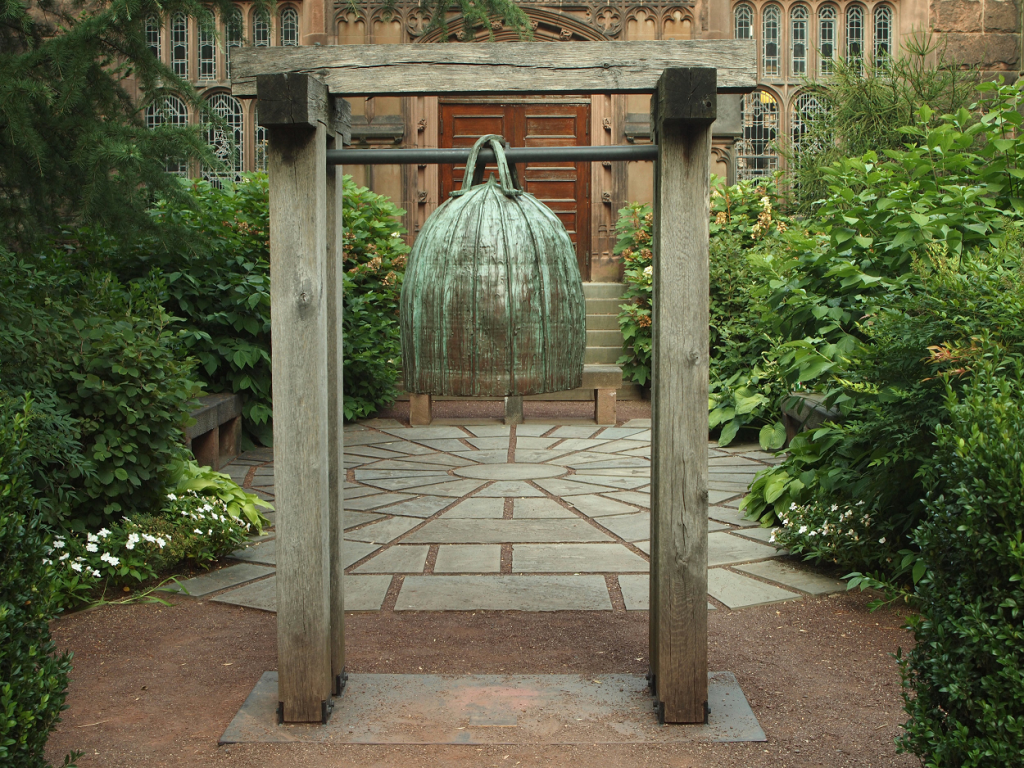
“Remembrance”
Date : 2000
Medium : Cast Bronze
Dimensions : Height – 32 1/2 inches × Diameter – 21 1/2 inches (82.5 × 54.6 cm)
Collection : Princeton University, Princeton, NJ (PP638)
Source: TOSHIKO TAKAEZU FOUNDATION
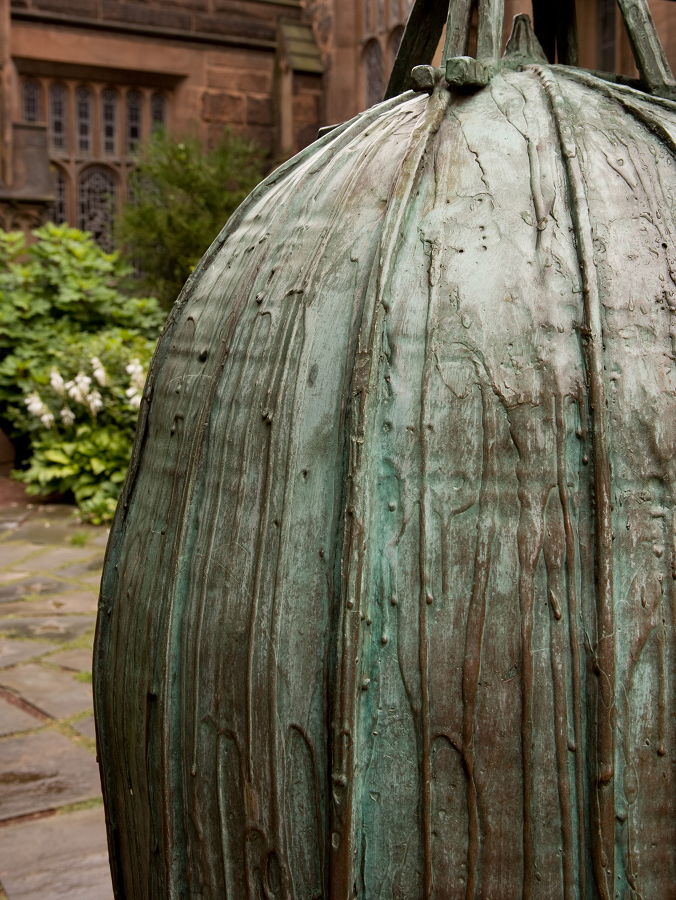
Detail of “Remembrance”
On the centennial anniversary of the birth of artist Toshiko Takaezu, the Noguchi Foundation and Garden Museum announced this major touring retrospective and monograph centered on her work and life. This will be the first nationally touring retrospective of Takaezu’s work in 20 years. To coincide with the exhibition, the Museum will publish a new monograph in association with Yale University Press. Also titled Toshiko Takaezu: Worlds Within, it represents the most ambitious monograph on an American ceramic artist to date.
This retrospective aims to trace the evolution of her practice and reframe the artist as one of the most compelling and conceptually innovative American artists of the last century. It considers the range, depth, and development of her work with a particular focus on the worlds she conjured within individual forms and in stunning environmental installations.
The title of the show is meant to evoke the vital sense of resonant space expressed in Takaezu’s work and alludes to her assertion that the most important aspect of her closed forms is “the dark space that you can’t see” — the hidden worlds within.
Kathe Kollwitz
The Museum of Modern Art
March 31—July 20, 2024
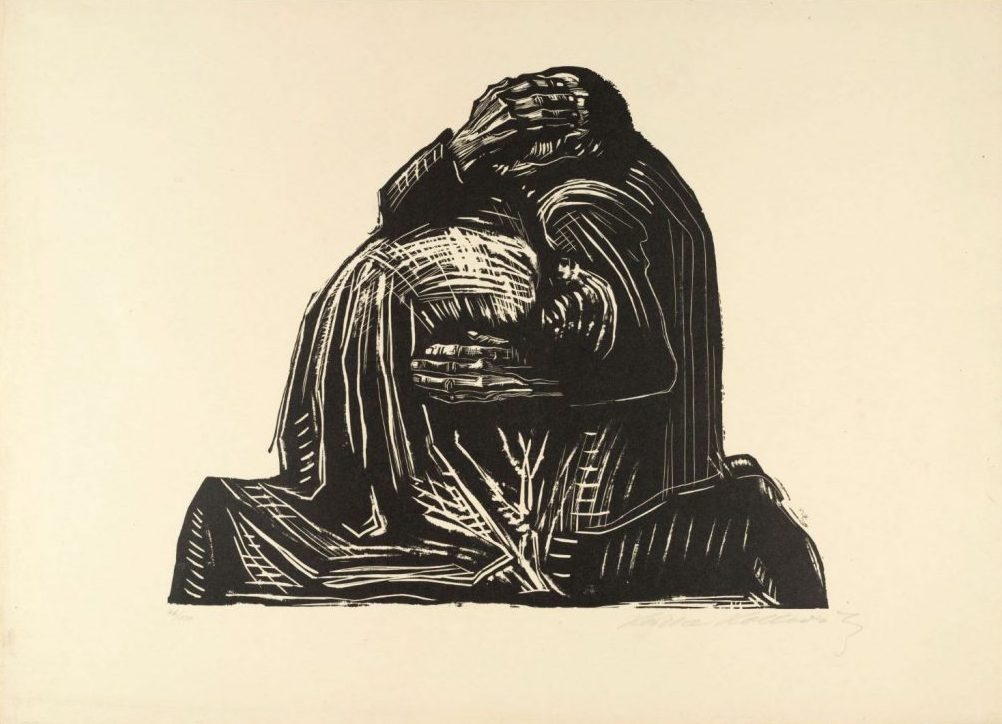
Käthe Kollwitz, ‘The Parents (Die Eltern)’ from ‘War (Krieg)’, (1921–22), published 1923.
One from a portfolio of seven woodcuts.
The Museum of Modern Art, New York.
Gift of the Arnhold Family in memory of Sigrid Edwards. © 2023 Artists Rights Society (ARS), New York / VG Bild-Kunst, Bonn.
This marks the first-ever New York City museum retrospective and the largest exhibition of Kollwitz’s work in the U.S. in more than three decades years. MoMA will present a focused exploration of the artist’s career in more than 100 rarely seen examples of her drawings, prints, and sculptures loaned from public and private collections in the US and Europe.
Organized chronologically, the exhibition will trace the development of the artist’s work from the 1890s through the 1930s, spanning a period of unprecedented turmoil in German history, including industrialization and the horrors of war.
“Firelei Báez”
Institute of Contemporary Art, Boston
April 4–September 2, 2024
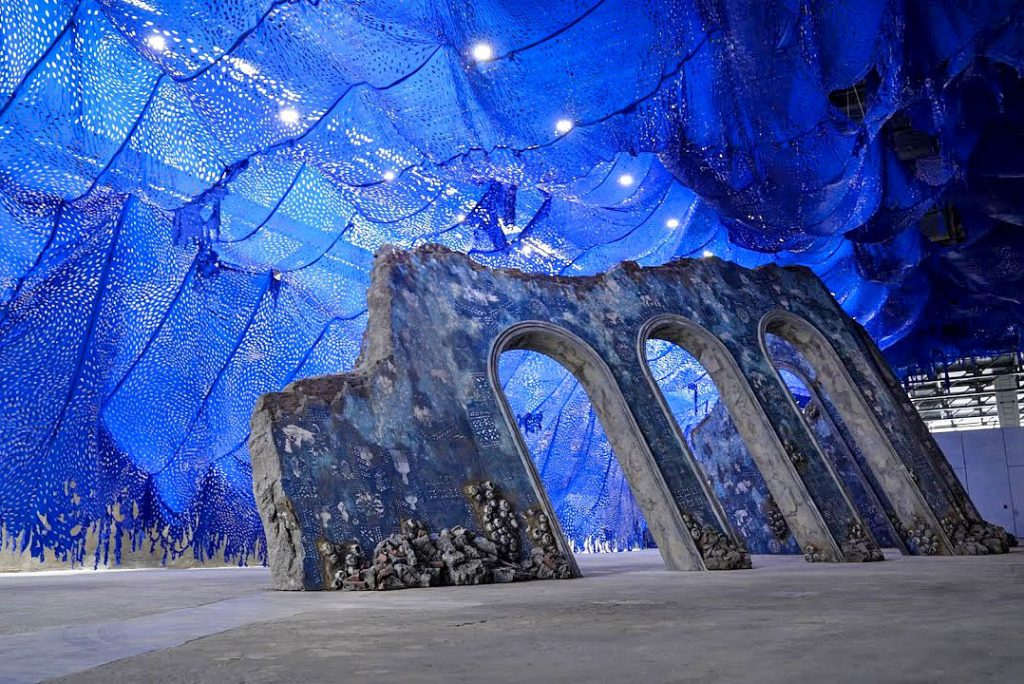
Firelei Báez, “To breathe full and free: a declaration, a re-visioning, a correction (19°36’16.9″N 72°13’07.0″W, 42° 21’48.762″ N 71°1’59.628″ W),” 2021.
Installation view, ICA Watershed, 2021.
Courtesy of the artist and James Cohan, New York.
Photo by Chuck Choi. © Firelei Báez
Beginning in April, the Institute of Contemporary Art in Boston (ICA) will present the first museum survey dedicated to the oeuvre of the Dominican Republic-born, New York-based Firelei Báez. It will span nearly 20 years of paintings, drawings, and installations, featuring approximately 40 works in all. The artist—and recipient of the 2010 Joan Mitchell Foundation Painters and Sculptors Award—explores the complex web of stories and identities pertaining to the Atlantic basin, blending history and fantasy to visualize Black and Brown narratives. Around 2017, the artist began creating large-scale works in which she painted directly onto archival materials such as maps and architectural renderings, alluding to a variety of disciplines, from anthropology and geography to folklore and science fiction. The spring exhibition will expand on Báez’s immersive installation at the ICA Watershed in 2021, while dazzling audiences with several new works, all highlighting Báez’s boundless capacity for sumptuous storytelling.
“Christina Ramberg: A Retrospective”
Art Institute of Chicago
April 20–August 11, 2024
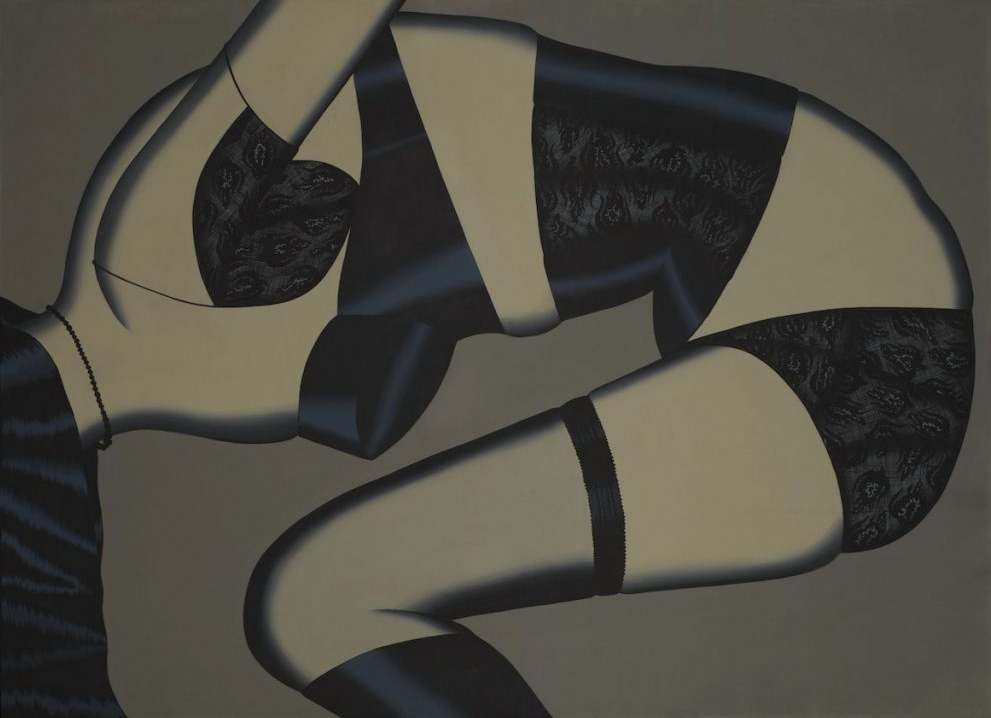
Christina Ramberg, ‘Waiting Lady’ (1972). Christina Ramberg.
Collection of Anstiss and Ronald Krueck, Chicago.
© The estate of Christina Ramberg.
Photography by Jamie Stukenberg
Known for her stylized, sexy paintings of women’s bodies—hands, hair, and torsos, pictured in fragments and sometimes bound—Christina Ramberg (1946–1995) emerged as one of the most influential artists in Chicago’s 20th-century art scene. In the decades since, Ramberg’s singular style has influenced contemporary artists such as Julie Curtiss. The long overdue retrospective will be the first significant show devoted to Ramberg’s art in nearly 30 years and will bring together almost 100 works, and bring together the artist’s iconic early career compositions that teeter toward abstraction, along with lesser-known textile works made in the 1980s, and as well as late career paintings from the 1990s.
“Jenny Holzer: Light Line”
Solomon R. Guggenheim Museum, New York
May 17–September 29, 2024
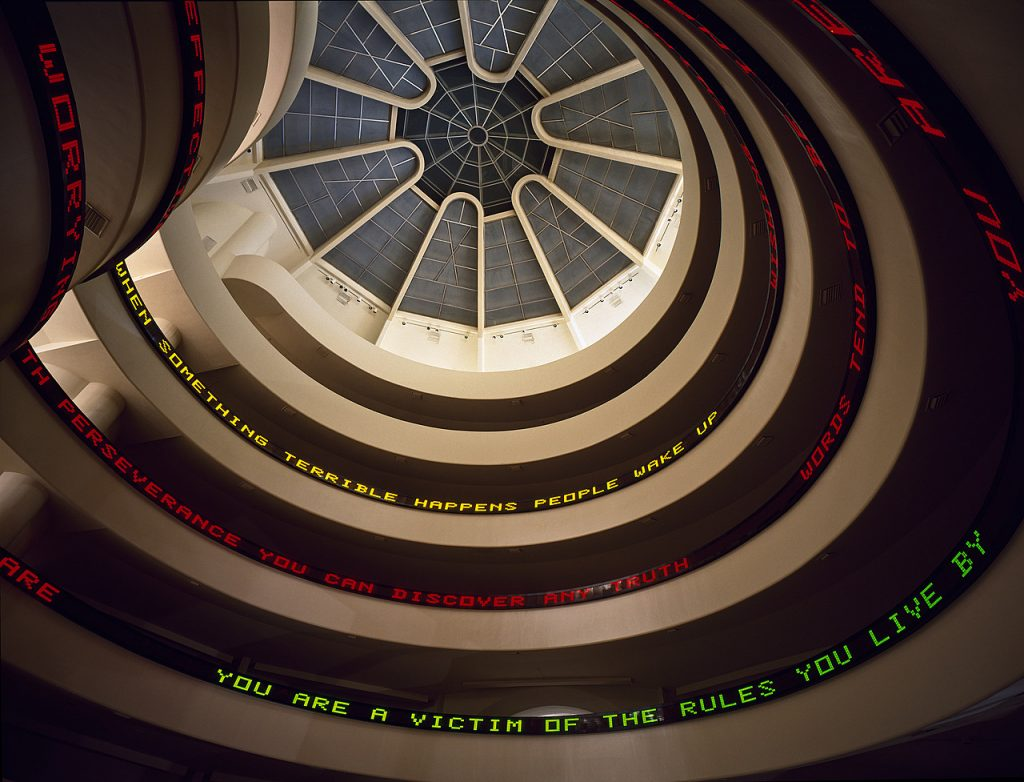
Jenny Holzer, Installation for the Solomon R. Guggenheim Museum (1989). Courtesy of the Guggenheim.
In 1989, Jenny Holzer programmed iterations of her Truisms one-liners to scroll, in rhythmic series, along a single strip of LED lights that climbed the spiraled walls of the Guggenheim’s rotunda. Next year, Holzer and the museum will honor the 35th anniversary of that landmark artwork by recreating it—albeit with some 21st-century updates.
In Light Line, Holzer’s hotly-anticipated retrospective scheduled for May, the installation will feature examples from both Truisms and the artist’s related series of text-based artworks, Inflammatory Essays. The LED be shown alongside a collection of pieces spanning Holzer’s career from the 1970s to now, including paintings, works on paper, and inscribed stone sculptures. And as a bonus, another one of the artist’s previous installations at the museum—2008’s façade-covering light projection, For the Guggenheim—will be re-shown during the opening week.
“Mary Cassatt at Work”
Philadelphia Museum of Art
May 18–September 8, 2024
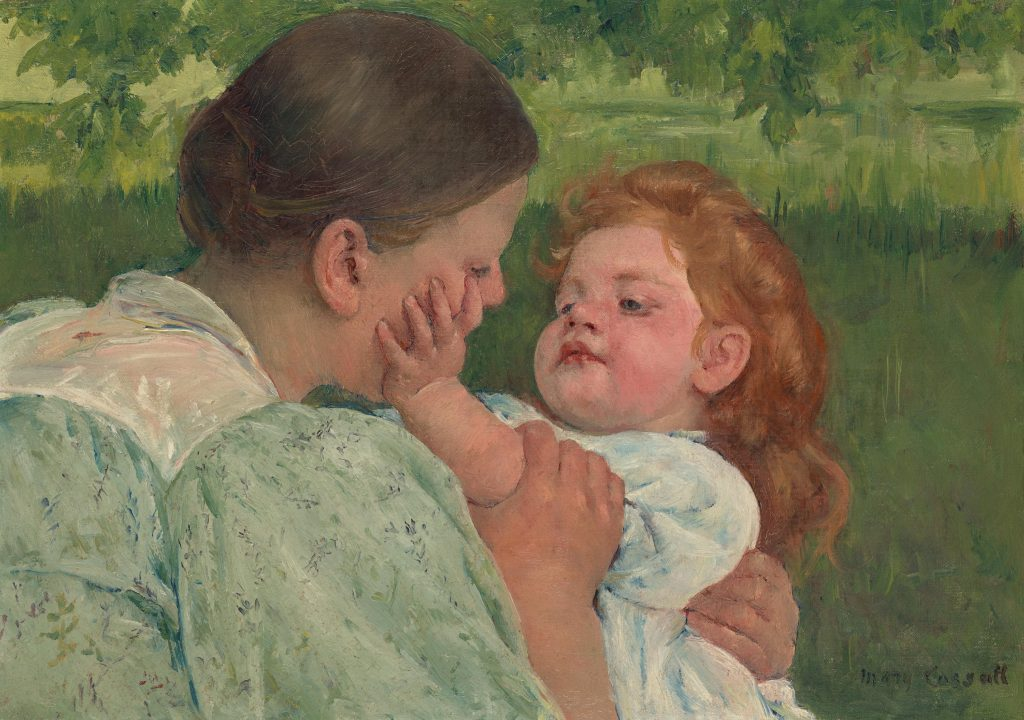
Mary Stevenson Cassatt, ‘Maternal Caress’ (1896).
Bequest of Aaron E. Carpenter.
Collection of the Philadelphia Museum of Art.
A favorite among the French Impressionists, American painter Mary Cassatt challenged expectations and pushed the boundaries of what was considered acceptable to depict in fine art. Known for her nuanced and empathetic compositions featuring women and children from everyday life, appreciation for her art has rarely delved into her pioneering portrayals of feminine pursuits, such as reading and embroidery, through the lens of gender and labor.
The exhibition “Mary Cassatt at Work,” comprised of more than 130 works including prints, pastels, and paintings seeks to rectify this oversite and offer new insight into the artist’s life and work. The show is significant as well as it is the first major presentation of Cassatt’s oeuvre since the late 1990s.
Source: artnet


